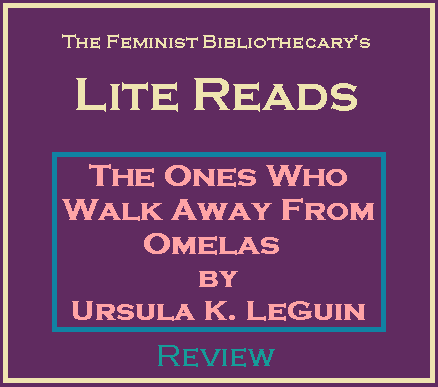
Week fifty-five of Lite Reads comes to a close as we finish our selection The Ones Who Walk Away From Omelas by Ursula K. Le Guin. There were questions as food for thought on social media as people had the chance to read it and think about it. Before I announce the next Lite Reads selection (September 15), I will be sharing my own thoughts here. Spoilers ahead for those who haven’t finished reading the story yet.
The Ones Who Walk Away From Omelas by Ursula K. Le Guin is a philosophical sci-fi story about a utopian city where everyone lives the ideal life because of the scapegoating of a single child. Le Guin uses extensive and flowering language to describe the ideal city that is Omelas before revealing, in equally extensive language, that there is a child suffering horrific abuse and neglect so that the utopia can continue. While most people either ignore the child or actively contribute to the child’s degradation, there are a few who “walk away” from Omelas after learning of the child, never to be seen again.
Le Guin’s descriptions of the utopian city of Omelas are vivid and flowering, but also just hazy enough to give you the room to imagine your own utopian ideals. It’s easy to picture this utopia, and the author ensures that. Her use of humour in these descriptions feels right at home. That is until she reveals that the city exists on the back of a child. Her descriptions of the horrors the child faces are just as vivid, although the child could be any child. It feels very reflective of how the residents of the city would view both the city and the child, both vividly but without focus. It’s interesting to see the ways that the focus on the utopia takes on a convincing tone, where you feel as though she is trying to sway you into considering the devastation necessary, just as the citizens of Omelas feel.
The description of the scapegoated child was incredibly hard to read. I probably should have offered a content warning for that in the selection post, and I apologise for not doing so. Witnessing the pain and horrors the child experiences impacts the citizens of Omelas in different ways, which seems natural and true to life, but is painful to read. No one is allowed to offer the child any kindness, and so we see those willing to ignore. Then there are others we see are willing to contribute to the degradation. And finally, there are those who are so disgusted by what is happening that they leave, unwilling to participate in something so heinous for their own gain. It seems that most people are in the second category, willing to ignore, and that feels all too true to life. I think most readers would like to think we would walk away, but atrocities happen to children all the time, and they are often largely ignored.
The Ones Who Walk Away From Omelas story was published in 1973, 46 years ago. As a philosophical story, it still feels particularly powerful and relevant despite its age. Marginalised peoples and communities are often left to the side as casualties of cruel political systems unwilling to offer support. Large companies are known to use child labour, including child slavery, and people still buy the products, participating in the system that directly harms those children. This story manages to show the damage of the “better them than me” mentality that so many people have, and show the ways people react to a scapegoat, even if they think themselves to be good people.
Overall, The Ones Who Walk Away From Omelas by Ursula K. Le Guin is a philosophically fascinating story with irresistably vivid language. It’s the kind of story that makes you think for a long time after you’ve read it. I would recommend it to anyone interested in the especially philosophical elements of science fiction (provided they are in the right headspace to read it). I actually haven’t read anything from Ursula K. Le Guin before this (I knooow!), but this definitely serves as a great introduction.
I hope everyone who participated by reading the story and following along on social media enjoyed the story. If you have more thoughts to add, please feel free to comment on this post, or anywhere on The Feminist Bibliothecary’s social media. Week fifty-six begins tomorrow, September 15, with a brand new short story selection.